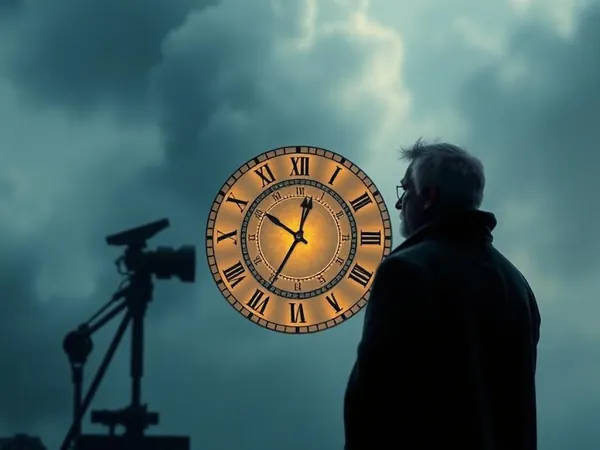
Physicist Claims to Have Resolved the Infamous Grandfather Paradox! Discover How!
2025-01-12
Author: Wei
Unraveling the Grandfather Paradox
The grandfather paradox poses a captivating dilemma. Imagine an adventurous time traveler who ventures back to halt the romance between their grandparents. This chain of events could ensure the traveler's non-existence, creating a paradox that shakes the foundations of time as we know it. So, can we alter events of the past, or is time a relentless tapestry, permanently woven to avoid such contradictions?
This intellectual challenge has captivated physicists and philosophers for decades. While some assert that such paradoxes render time travel infeasible, others propose that nature could inherently enforce consistency—where everything aligns seamlessly to avoid any logical discrepancies.
The Theory of General Relativity: A Doorway to Time Loops?
Our everyday experience views time as linear, moving steadily from past to present to future. However, the revolutionary ideas proposed by Albert Einstein’s theory of general relativity unravel this straightforward perspective, suggesting that space and time are intricately linked and malleable.
One astonishing consequence of this theory is the potential existence of closed timelike curves. These fascinating constructs in spacetime suggest that a traveler could, theoretically, revisit moments from the past. Some scientists speculate about phenomena such as black holes being capable of enfolding space and time enough to produce such loops.
However, this tantalizing idea hasn’t gone without skepticism. Legendary physicist Stephen Hawking proposed the chronology protection conjecture in 1992—claiming that the laws of physics would prevent paradoxical time loops to protect the logical order of events. Still, the pursuit of these theories continues to intrigue and inspire!
Enter Lorenzo Gavassino: A New Quantum Approach
This is where Lorenzo Gavassino's work enters the spotlight. His groundbreaking research, published in December 2024 in Classical and Quantum Gravity, introduces a novel and remarkable solution to the grandfather paradox using principles derived from quantum mechanics and thermodynamics.
Gavassino’s hypothesis hinges on entropy, the measure of disorder within a system, which tends to increase according to the laws of thermodynamics. This increase serves as a directional guide for time, helping us remember the past while precluding any alterations to it.
However, in the imaginative realm of a time loop, Gavassino argues that quantum fluctuations—spontaneous variations dictated by the uncertainties of quantum mechanics—could lead to a reversal of this natural order. This shocking premise suggests that a time traveler might witness their own memories fade and experience a reversal of aging while preventing their grandparents' fateful encounter without causing irreversible consequences. Through this mechanism, any attempt by a time traveler to alter history would be reset, preserving the consistent fabric of events.
Self-Coherence: The Key to Understanding Time Travel?
While the idea of self-coherence is not entirely new, Gavassino’s work stands out for simplifying this concept with established quantum principles. In the 1980s, Igor Novikov posited that any events occurring in a time loop must conform to a consistent narrative. Gavassino brings this principle back to the forefront, demonstrating that self-coherence reflects naturally from quantum laws and thermodynamic principles, eliminating apparent logical contradictions.
What Lies Ahead?
The implications of Gavassino’s research are both mind-bending and transformative. If time loops exist, they could alter our foundational comprehension of time and reality. However, lingering questions fuel our curiosity. Gavassino does not claim that these loops are currently present in our universe. His theories provide a merely theoretical framework grounded in specific assumptions. Furthermore, even if such loops were achievable, the astronomical energy required to bend spacetime sufficiently remains well beyond our current capabilities.
Though the full realization of time travel and its accompanying paradoxes may evoke uncertainties, Gavassino's breakthroughs illuminate profound inquiries. As we probe deeper into the complexities of entropy and quantum behavior, we might ultimately unveil the hidden mechanisms that govern our perception of time. Stay tuned, as new theories could not only reshape our interpretation of our reality but perhaps even lay the groundwork for the impossible: time travel itself!



 Brasil (PT)
Brasil (PT)
 Canada (EN)
Canada (EN)
 Chile (ES)
Chile (ES)
 Česko (CS)
Česko (CS)
 대한민국 (KO)
대한민국 (KO)
 España (ES)
España (ES)
 France (FR)
France (FR)
 Hong Kong (EN)
Hong Kong (EN)
 Italia (IT)
Italia (IT)
 日本 (JA)
日本 (JA)
 Magyarország (HU)
Magyarország (HU)
 Norge (NO)
Norge (NO)
 Polska (PL)
Polska (PL)
 Schweiz (DE)
Schweiz (DE)
 Singapore (EN)
Singapore (EN)
 Sverige (SV)
Sverige (SV)
 Suomi (FI)
Suomi (FI)
 Türkiye (TR)
Türkiye (TR)
 الإمارات العربية المتحدة (AR)
الإمارات العربية المتحدة (AR)